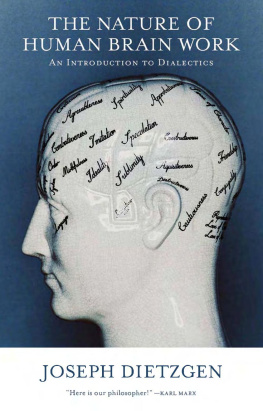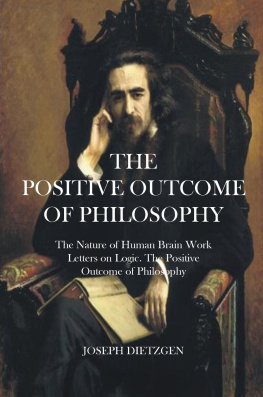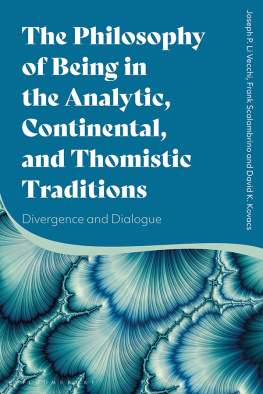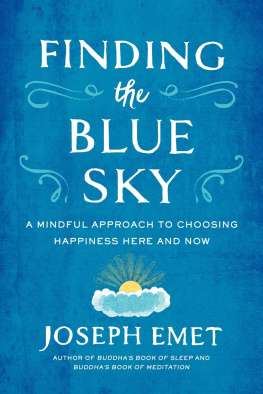Joseph Dietzgen - The Positive Outcome of Philosophy
Here you can read online Joseph Dietzgen - The Positive Outcome of Philosophy full text of the book (entire story) in english for free. Download pdf and epub, get meaning, cover and reviews about this ebook. year: 2016, genre: Religion. Description of the work, (preface) as well as reviews are available. Best literature library LitArk.com created for fans of good reading and offers a wide selection of genres:
Romance novel
Science fiction
Adventure
Detective
Science
History
Home and family
Prose
Art
Politics
Computer
Non-fiction
Religion
Business
Children
Humor
Choose a favorite category and find really read worthwhile books. Enjoy immersion in the world of imagination, feel the emotions of the characters or learn something new for yourself, make an fascinating discovery.

- Book:The Positive Outcome of Philosophy
- Author:
- Genre:
- Year:2016
- Rating:5 / 5
- Favourites:Add to favourites
- Your mark:
- 100
- 1
- 2
- 3
- 4
- 5
The Positive Outcome of Philosophy: summary, description and annotation
We offer to read an annotation, description, summary or preface (depends on what the author of the book "The Positive Outcome of Philosophy" wrote himself). If you haven't found the necessary information about the book — write in the comments, we will try to find it.
The Positive Outcome of Philosophy — read online for free the complete book (whole text) full work
Below is the text of the book, divided by pages. System saving the place of the last page read, allows you to conveniently read the book "The Positive Outcome of Philosophy" online for free, without having to search again every time where you left off. Put a bookmark, and you can go to the page where you finished reading at any time.
Font size:
Interval:
Bookmark:

Source: Project Gutenberg www.gutenberg.org;
Translated: by Ernest Untermann.
Title: The positive outcome of philosophy: The Nature of Human Brain Work; Letters on Logic. The Positive Outcome of Philosophy;
Written: by Joseph Ditezgen, with an introduction by Anton Pannekoek, edited by Eugene Dietzgen;
First Published: by Charles. H. Kerr & Co., Chicago 1906;
Transcribed: by Kavindu Herath.
As a father cares for his child, so an author cares for his product. I may be able to give a little additional zest to the contents of this work by adding an explanation how I came to write it.
Although born by my mother in 1828, I did not enter my own world until the mad year, 1848. I was learning the trade of my father in my paternal shop, when I saw in the Klnische Zeitung, how the people of Berlin had overcome the King of Prussia and conquered liberty. This liberty now became the first object of my musings. The parties of that period, the disturbers and howlers, made a great deal of fuss about it. But the more I heard about it, and hence became enthusiastic over it, the duller, hazier and more indistinct became the meaning of it, so that it turned things upside down in my head. The psychologists have long known that enthusiasm for a cause and understanding of that cause are two different things. Mark, for instance, the zeal displayed by Catholic peasants in singing their mass, although they do not understand a word of Latin.
What is meant by political freedom? What is its beginning, what its end? Where and how are we to find a positive and definite knowledge of it? In the parties of the middle, the so-called constitutionals, as well as among the bourgeois democrats, there was no end of dissension. Nothing could be learned there. Among them, as among the Protestants, every one was a chosen interpreter of the gospel.
However, the papers of the extremes, that is, the Neue Preussische with its For God, King and Fatherland, and the Neue Rheinische, the organ of Democracy, gave me a hint that liberty had some sort of a material basis. During the following years, my life in rural surroundings gave me leisure to follow this scent. On one side, it was the work of men like Gerlach, Stahl, and Leo, on the other of Marx and Engels, that gave me a foothold.
Though the communists and the ultra-conservatives came to widely different conclusions, still I felt and read between the lines that both of these extreme parties based their demands on one fundamental premise. They knew what they wanted; they both had a definite beginning and end. And that permitted the assumption that both had a common philosophy. The Prussian landholding aristocracy based the cross, which they wore as an emblem on their hats, on the historically acquired royal military power and on the positive divine revelation of the Bible printed in black and supported by the ecclesiastical police force dressed in black. And the Communist point of departure was quite as positive, unquestionable and material, viz., the growing supremacy of the mass of the people with their proletarian interests based on the historically acquired productive power of the working class. The spirit of both of these hostile camps was descending from the results of philosophy, primarily from the Hegelian school. Both of them were armed with the philosophical achievements of the century, which they had not only mechanically assimilated, but rather continually provided with fresh food like a living being.
In the beginning of the fifties, a pamphlet was published by one of the cross bearers, Stahl, entitled Against Bunsen. This Bunsen was at the time the Prussian Embassador at London, a crony of the ruling Prussian King Frederic William IV., and, apart from this, nothing but a liberal muddle head who was interested in political and religious tolerance.
The pamphlet of the cross bearer Stahl attacked this tolerance and demonstrated valiantly that tolerance could be preached only by a muddled free lance to whom religion and fatherland were indifferent conceptions. Religious faith, so far as it is truth, so he said, has a true power and can transpose mountains. Such a faith could not be tolerant and indifferent, but must push its propaganda with fire and sword.
In the same way in which Stahl defended the interests of the landed aristocracy, the philosopher Feuerbach spoke in the interest of the infidel revolutionaries. Both of them were to that extent in accord with the Communist Manifesto that they no longer regarded Liberty as a phantasmagoria, but as a being of flesh and blood.
When I had realized this, it dawned upon me that any conception elucidated by philosophy, in this case the idea of liberty, had this peculiarity: Liberty is as yet an abstract idea. In order to become real, it must assume a concrete, special form.
Political freedom as a glittering generality is a thing of no reality. Under such fantastic ideal the constitutionalists or the liberals conceal the liberty of the money bag. Under these circumstances, they are quite right in demanding German unity with Prussia as a head, or a republic with a grand duke at the top. The landed aristocracy also are right in demanding the liberty of that aristocracy. And the Communists are still more right, for they demand the liberty that will guarantee bread and butter for the mass of the people and will fully set free all the forces of production.
From this experience and conclusion it follows that true liberty and the highest right are composed of individual liberties and rights, that are opposed to one another without being inconceivable. It is easy to proceed from this premise to the rule of thought laid down in this work, that the brain need not make any excursions into the transcendental in order to find his way through the contradictions of the real world.
In this way I passed from politics to philosophy, and from philosophy to the theory of positive knowledge which I presented to the public in 1869 in my little work The Nature of Human Brain Work. Further studies on the general powers of understanding have added to my special knowledge of this subject, so that I am now enabled to fill the old wine into a new bottle instead of publishing a new edition of my old work.
The science which I present in the following pages is very limited in its circumference, but all the better founded and important in its consequences. This, I trust, will be accepted as a sufficient excuse for the recurring repetition of the same statements in a different form. My remaining confined to a single point requires no apology. What is left undone by one, is bequeathed as a problem to others.
There might be some dispute over the question, how much of this positive achievement of philosophy is due to the author and to his predecessors. But that is an interminable task of small concern. No matter who hoisted the calf out of the well, so long as it is out. Anyway, this whole work treats of the concatenation and interdependence of things, and this also throws a bright light on the question of mine and thine.
J. Dietzgen.
Chicago, March 30, 1887
That which we call science nowadays was known to our ancestors by a name which then sounded very respectable and distinguished, but which has in the meantime acquired a somewhat ludicrous taste, the name of wisdom. This gradual transition of wisdom into science is a positive achievement of philosophy which well deserves our attention.
The term ancestors is very indefinite. It comprises people who lived more than three thousand years ago as well as those who died less than a hundred years ago. And a wise man was still respected a hundred years ago, while to-day that title always implies a little ridicule and disrespect.
Font size:
Interval:
Bookmark:
Similar books «The Positive Outcome of Philosophy»
Look at similar books to The Positive Outcome of Philosophy. We have selected literature similar in name and meaning in the hope of providing readers with more options to find new, interesting, not yet read works.
Discussion, reviews of the book The Positive Outcome of Philosophy and just readers' own opinions. Leave your comments, write what you think about the work, its meaning or the main characters. Specify what exactly you liked and what you didn't like, and why you think so.




